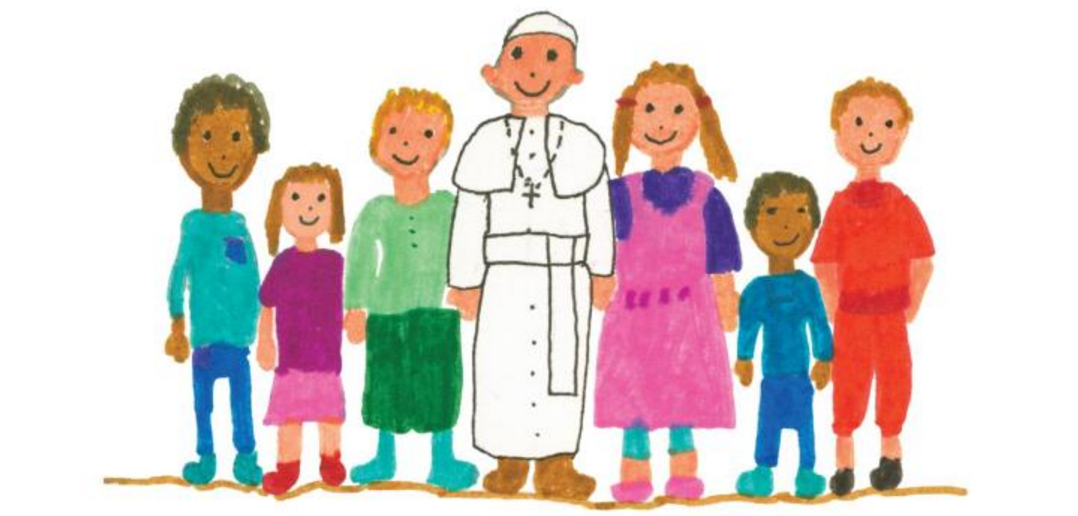
Even before it became available on March 1, Loyola Press’s Dear Pope Francis was listed on Amazon as a #1 Best Seller in its category (Other Christian Denominations and Sects). Thirty letters from children to the pope are answered in a picture book intended to simulate a series of heart-to-heart chats with Francis. I wish I could say I am charmed by Dear Pope Francis. It feels churlish to object to a children’s book illustrated with hand-drawn pictures of kindly Papa Francis suffering unto himself the little ones. Nevertheless, I cannot shake off a sense that a certain cynicism lurks in the heart of the project.
Rorate Caeli posted an excerpt from the book on February 28th. John Vennari discussed that same section in full for Catholic Family News. Vennari’s title captures the essence of it “Francis’ Vulgar Comments on the Latin Mass.” Like Obama reminiscing about his youthful drug experiences, Francis admits to a nine year old that he horsed around with the language of the Mass when he served as an altar boy. And why not? No one understood the Latin anyway. (Hint: good riddance to it.) Besides, it was fun.
My own concern is less with its parts—some of which are undeniably sweet—than with the very fact of it. The book raises a question: In a consumer culture, is the papacy itself is a product to be marketed like soap? Or a politician on the stump?
It seems so. Francis is positioning himself as a celebrity brand: the People’s Pope. In the words of Kirkus Reviews: “The People’s Pope shows that he is a down-to-earth man who understands both religion and children.” But whether a pope understands children is irrelevant to his office. It is meaningful only to a populace who views the papacy as it does the state—as a nanny.

Dear Pope Francis is designed to look like a collection of spontaneous queries. But it is not. Questions and drawings had been solicited with intent from kids aged six to thirteen in Jesuit schools. Content ranges all over the map, from the theological (Why didn’t God defeat the devil?) to variations on a fanzine Q and A (Did you like to dance in your youth?) It opens with groupie-speak. Think Justin Bieber at Madison Square Garden:
When I saw you at St. Peter’s Square, I felt great joy when you looked at me. What do you feel when you look at children around you?
None of the questions with a religious or social tenor are beyond the answering power of any adult. Entries are selected for charm and the opportunity they offer a copywriter to present Francis in an endearing light. The childish art work, suggesting innocence and improvisation, is intended for adult consumption. (Children do not need to look at other kids’ drawings. They need to acquire visual discernment by being shown the finest illustration available. )
On the left side of each spread is the child’s submission, with name, age, and country of origin. On the right, is Francis’ response printed on paper intended to look as if the child had been answered personally on Vatican stationery. But that is make believe. According to Kirkus, Francis’ responses were crafted in discussion with editor and papal spinmeister Anthony Spadaro, S.J.
Publisher’s Weekly calls Dear Pope Francis “a uniquely candid project.” But the illusion of candor is staged. The book is a calculated exercise in image enhancement devised by Loyola Press in concert with the Jesuit Refugee Service (JRS), which benefits from sales. On March 2, Frs. Spadaro and James Martin plugged it in a scheduled evening program at the Sheen Center. Some “fun stories” about Francis were promised. The price of admission went to the JRS. (The JRS is an international NGO that advocates for the rights of illegals. It finds legal help for “asylum seekers,” using a broad definition of the term.)
Exploitation of children, as props or excuses for action, is nothing new or original. Politicians routinely use children as props; they are standard items in the stagecraft of dictators. What is new is the gaudy, and growing, spectacle of a pope adopting the same tactics to amplify his celebrity and underwrite its uses.

Francis has already produced two books, each promoting the Year of Mercy. His children’s book comes on the heels of the English language edition of the Vatican cookbook Buon Appetite, a selection of Francis’ favorite dishes. Add a 7-day Year of Mercy cruise for deep pocket art patrons to benefit Vatican art museums. In all, Jorge Bergolio proves surprisingly entrepreneurial for a man so crudely hostile to market economies.


